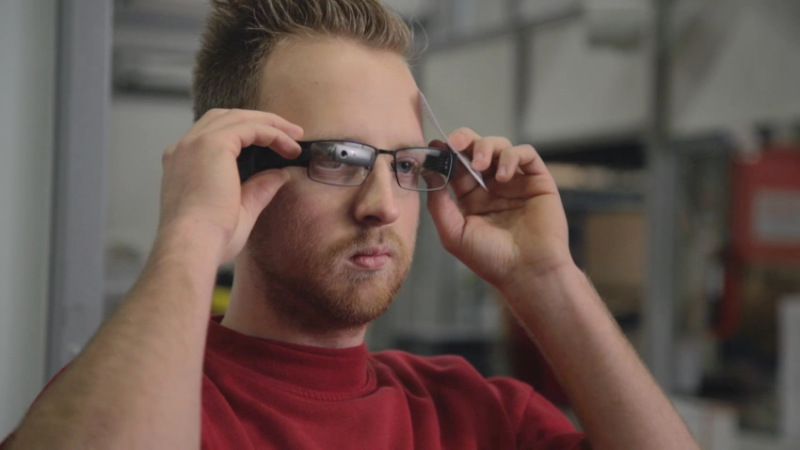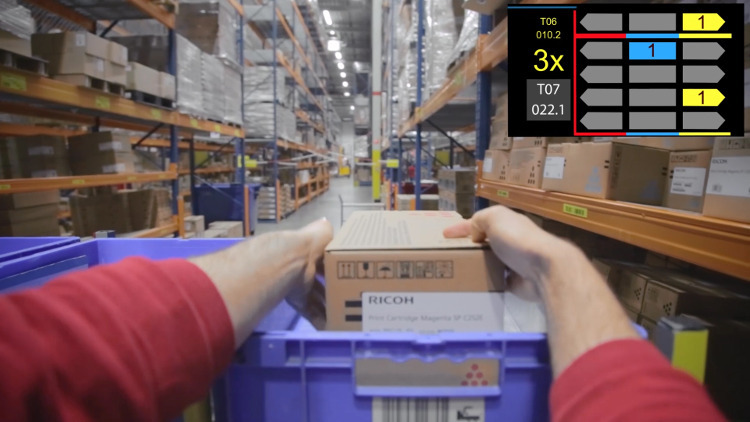Vision of the future – order picking with smart glasses and wearable computing solutions from Ubimax
Digital/Industry 4.0Augmented reality in logistics with the Bremen-based market leader

A shelf in the Schuppen 2 building in Bremen’s Überseestadt district, stacked to the top with office supplies. Pens, glue, sticky tape. And next to it a trolley with empty trays. My task: to allocate supplies from the shelf to an order – so-called order picking. Using Google Glass, a pair of smart glasses with a transparent display. Glasses on, and we’re off: a graphic appears in my field of vision. Two lots of glue from shelf 2.1 to be placed in tray 3. Grab the indicated items, scan the barcodes using the built-in camera in the glasses and place the items in the trolley. Simple. The smart glasses take a little getting used to initially, but at 54 grams they’re comfortable to wear. The display in the top right corner feels natural and doesn’t get in the way. And the major advantage is that my hands are free.
Order picking lists and hand-held scanners are now a thing of the past. In many warehouses this is still how orders are picked, i.e. with a printed list and a picker who makes his or her way through the warehouse in search of the correct shelf. Smart glasses make this method obsolete. And besides the elements of each order, they can also display the route through the labyrinth of the warehouse.

Ubimax is both the market leader and a pioneer
All this is possible thanks to the xPick software created by wearable computing specialist Ubimax. Based in Bremen’s Überseestadt district, the global market leader develops hardware and software that connects humans and machines. “The advantages are obvious: both hands are free to do the actual task, the number of errors is reduced through detailed graphical instructions, and every process step is documented digitally and can be retraced at any time,” explains Leonid Poliakov, Head of Marketing and project manager at Ubimax.
Efficiency gains of 25 per cent in logistics
One company already using the technology is DHL. During a pilot project in early 2015, ten order pickers at a distribution centre in the Netherlands were equipped with smart glasses, and the xPick pick-by-vision software was directly connected to the company’s warehousing system. The result: the testers picked 20,000 items for 9,000 orders with a minimal error rate, and were 25 per cent more productive than their colleagues who were using hand-held scanners. That piqued the management’s interest, and they are now preparing to introduce the system at more of its warehouses with an extended pilot project.
Intel uses Ubimax in its distribution center
A more recent example is the Intel distribution center in Arizona. Developed by Ubimax, Intel successfully deployed in early 2017 the Pick-by-Vision solution xPick. By using a combination of smart glasses a wearable ring scanners, pickers reduced their required pick time per box by 29 percent. On the very first use without any training, order pickers were already 15 percent faster using Vision Picking compared to the picking process with hand-held scanners. Based on the promising outcomes, Intel is evaluating the further expansion of the xPick solution in its warehouses around the globe.
The manufacturer of the smart glasses, Intel Recon Jet, has produced a video showing the advantages of the system:
More on this in our privacy policy.
Focus on usability
Its success lies in the ease of use. The display is self-explanatory and integrates naturally into the field of vision. And I’ve certainly found it easy to use. I don’t even want to take the glasses off – why can’t I always have useful information in my field of vision? “Humans can interpret graphical information faster and with fewer errors than, say, alphanumerical character strings such as text, or even sound. The latter is also transient, i.e. it disappears as soon as it has been played, and is no longer available to the user,” Poliakov explains. Which is why the Bremen-based company places such a high value on an intuitively designed user interface. Large symbols, clear messages. A further advantage of smart glasses is that employees can be trained more quickly, which is particularly useful to companies with high staff turnover. And the connection to the ERP system, which records all processes within a company, means that all process steps are digitally recorded and can be retraced. The customer wants to cancel an order? One click is enough to check if the item has been packed yet. The smart glasses are the interface between human and machine, and that has persuaded DHL as well as Intel.
Customised solutions for any company
Other leading companies such as Mercedes-Benz or VW also use xPick, and the software is adapted to their local requirements. “First we analyse the customer requirements exactly, then we develop a made-to-measure solution that connects to the existing systems, and finally we provide the hardware,” Poliakov says of the project process. It takes six to eight weeks to install a new system. Besides the smart glasses, Ubimax also provides smart watches and intelligent wristbands. These can be used not only for order picking, but also for other processes where smart glasses can help, e.g. providing expert remote support for a mechanic. DHL have produced a video showing how order picking using smart glasses works in practice:
More on this in our privacy policy.
Success Stories
Bremen’s Economy in Figures: Statistics 2025
The State of Bremen is a strong economic hub. A look at the latest statistics highlights its economic strength — summarising key data such as cargo volumes, export performance, industry turnover, and more.
Learn moreMedium-Sized Companies in Bremen Showcasing the Full Range of the Local Economy
Medium-sized companies form the backbone of Bremen’s economy. They create jobs and produce goods that are in demand worldwide. Here is a selection of ten businesses that illustrate the diversity of Bremen’s economic landscape.
Learn moreTwelve international food and beverage companies in Bremen
Becks and Melitta may be high-profile brands, but international food and beverage companies also manufacture lots of other products in Bremen and Bremerhaven. Here are twelve examples.
Learn more
